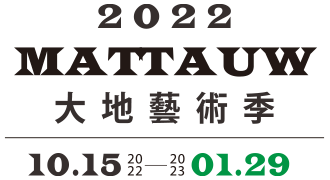WHEN I THINK ABOUT THE ZENGWEN RIVER
約書亞・沙發兒,2022年八月
When I think about the Zengwen River, I think about how my time in Taiwan, since December of last year, has been ruled by water; the ubiquitous and essential liquid that forms the basis of every living organism including me, and including you.
When I think about the Zengwen River, I think about how water is a master of transformation, from solid ice, to liquid, to steam.
When I think about the Zengwen River, I think about how water is a master escapologist running out of my grasp but also away from my understanding.
When I think about the Zengwen River, I think about traveling from Tainan to Balin on the train every Friday and crossing over the Zengwen River on the rail bridge and looking down at a cluster of excavators, heavy construction equipment, which are there every time, shovelling earth from the river banks into their buckets and onto the back of trucks but for what purpose I have no idea.
When I think about the Zengwen River, I think about the bus journey to the Zengwen Reservoir and to being shocked by the depth and weight of the water and then to arriving in Dapu and picking and pickling plums.
When I think about the Zengwen River, I think about how I learnt that the Zengwen Reservoir is partly a military defence, storing up survival in the case of attack.
When I think about the Zengwen River, I think about how the water in that reservoir is carried by the river to the sea and that some of it, a lot of it, is syphoned off to irrigate the fields, wash cars, make beef noodle soup, flush toilets, brew tea.
When I think about the Zengwen River, I think about being in the NCKU gym where I go to take exercise and staring down through the large glass windows to the swimming pool below and the feeling of yearning to dive into that inviting water, to feel my body submerged, and realising that is exactly how I felt when I was standing on the banks of the Zengwen Reservoir but that swimming there was forbidden and anyway at the same time knowing that I’m actually a pretty bad swimmer.
When I think about the Zengwen River, I think about the leaking roof in my top floor apartment that dripped stains onto the parquet until, over several visits, the landlord’s builders came and injected foam into the roof cavity, diverting the water to some unknown other place.
When I think about the Zengwen River, I think about the filtering and then boiling and then refrigeration of the tap water that I have to remember to plan in, so that I can remain alert to the constant entreaties to stay hydrated: “It’s scorching hot, so make sure that you drink enough water”.
When I think about the Zengwen River, I think about the sudden torrential rains that are welcome because they fill the Zengwen Reservoir but that catch you unawares when you are on your electric scooter in shorts and a t-shirt and soak you in seconds as you try to find a 7Eleven to buy (another) ‘disposable’ rain jacket.
When I think about the Zengwen River, I think about the men and the women who ride their scooters in the rain barefoot so that they don’t get their shoes wet and to experiencing a kind of envy as I see their soles touch the footrest, or the road when they stop at traffic lights, but not somehow believing that I too could take my shoes off and ride my scooter barefoot in the rain.
When I think about the Zengwen River, I think about the showers that I wanted as hot as possible in the surprisingly cold days of January when the lack of indoor heating made me feel colder here than I ever did in London, or even, for that matter in the dark Nordic winter of the Arctic Circle, but that now I can’t get the water cold enough, desperate to try and cool my sunburnt skin.
When I think about the Zengwen River, I think about the mangos and the oranges and the pomelos in the fields of Guantian and how they are irrigated by an underground network of canals and how a mango is itself 79% water, and an orange is 86% water, and a pomelo is 89% water, and how good that water tastes.
When I think about the Zengwen River, I think about the strange hydro-engineered water portal at the incongruously named Little Switzerland, that connects the Zengwen River with the Wushanto Reservoir and funnels the water into the canals and ultimately into fields and how this giant swirling water funnel appears to me so much like gateway to another dangerous but thrilling unknown world and also at the same time it somehow seems to be a kind of accidental public artwork (though how accidental I can’t be sure) but that nobody that I speak to about it really seems to match my enthusiasm.

